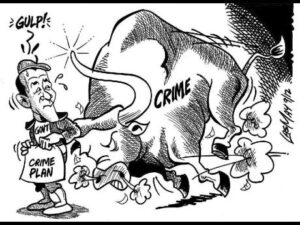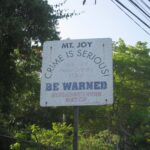Caliban Untamed: In/security, Memory, and the Unmaking of Postcolonial Jamaica
Kimberley D. McKinson, 2023-24 RPW Center Faculty Fellow. This year’s group is exploring the theme of “The Place of Memory.”
Crime & Punishment
The popular perspective on Jamaica is that it is enveloped by spectacular violence. Kingston, Jamaica’s capital city and its cultural, political, and economic hub has historically represented the hotbed for most of the island’s criminal activities. This characterization of Kingston as a gritty, crime-ridden, and almost theatrically violent urbanscape has certainly been cemented through Jamaican cult classic films such as The Harder They Come (1972), Third World Cop (1999), and Shottas (2002). These cinematic representations capture well the fact that in Jamaica, crime has only steadily escalated since the nation gained independence from Britain in 1962. In that year, the murder rate was 3.9 per 100,000 inhabitants, among the lowest in the world. By 2006, Jamaica had earned the dubious title of “the murder capital of the world.” In 2014, 49.8% of Jamaicans listed security as the most important problem facing the country and as of 2021, the island remains in the top ten of countries with the highest crime rates.
In Jamaican popular media, crime is often characterized as a bestial monster cannibalizing the nation and incapable of being tamed by the state. Still, my experience of conducting ethnographic fieldwork in Kingston coupled with my experiences of being raised in Jamaica and thus navigating the island’s high crime landscape as both “native” and “native anthropologist” have taught me that violence spectacularized is but one lens through which to tell the story of Jamaica’s crime monster. My research and my book project, Caliban Untamed: In/security, Memory, and the Unmaking of Postcolonial Jamaica, thus asks: What other kinds of stories need to be told about Jamaica’s crime monster?
Brave New World

Taking Caliban—the half human, half monster dramatized in Shakespeare’s The Tempest and reinterpreted by Caribbean postcolonial thinkers such as Kamau Brathwaite, Aimé Césaire, George Lamming, and Roberto Fernández Retamar—as metaphor for the Jamaican contemporary crime monster as well as symbolic of the conundrum of Caribbean postcolonial identity, my project positions in/security as the defining feature of the Jamaican postcolonial experience. Central to my elaboration in Caliban Untamed is a deliberate stylization of in/security using a virgule as a way to call attention to the connecting and conflicting ways in which security and insecurity are rooted and routed together in high crime Jamaica. In teasing apart this idea through the thin line of intimacy/opposition and union/separation of the virgule, the book traces the ways in which Jamaicans become tethered to genealogies of in/security that are sedimented in and animated through an assemblage of civic discourse, infrastructure, technology, bodies, matter, and data across the spatio-temporal breadth of the racialized and classed Jamaican postcolonial landscape. In so doing, the project charts the complex ties that bind present-day Jamaican in/security to a longer history of political and cultural practices central to the making of the island as a black geography.


Written in a creative mode, Caliban Untamed draws on experimental storytelling in order to fully cast light upon the layered temporalities of in/security in Kingston’s fortress city. Weaving ethnography, auto-ethnography, and memoir, the book’s architectural design invokes the palimpsest as the monographic form through which to consider the recursivity of postcolonial in/security. Central to the narrative arc of the project are, what I call, memoryscapes, narrative compositions that span four generations of my Jamaican family—living, dead, and future—and reveal the inter-generational vertigo of in/security in postcolonial high crime Jamaica. These memoryscapes go beyond the limits of traditional ethnography in order to unapologetically bring the whole self to the page. It is by being fully attuned to this ethos that I articulate the memoryscape as a decolonial methodology and writerly orientation invested in the politics of postcolonial witnessing and repair.
Caliban Untamed reflects a commitment to scholarship that cuts across social science and humanistic boundaries. In offering a narrative that entangles ethnography and memoir, this project highlights Jamaica, and by extension, the wider Black Atlantic, as critical spaces that both disrupt and open up new ways for problematizing the cultural phenomena and geo-political implications surrounding Black in/security. Moreover, Caliban Untamed embraces a transgressive mode that articulates new ways of methodologically studying and creatively writing about the reversals and swings which define life in the postcolonial Caribbean.
 Kimberley D. McKinson is a cultural anthropologist whose research interests lie at the intersection of insecurity, memory, postcoloniality, and storytelling in Jamaica. Her writing has appeared in Cultural Anthropology, the Journal of Latin American and Caribbean Anthropology; Surveillance and Society, and Sapiens. Kimberley’s in-progress book manuscript is titled Caliban Untamed: In/security, Memory, and the Unmaking of Postcolonial Jamaica. Her research has been supported by the National Science Foundation, the UC Center for New Racial Studies and the UC Collaboratory for Ethnographic Design. Kimberley is an Assistant Professor in Vanderbilt University’s Department of Anthropology.
Kimberley D. McKinson is a cultural anthropologist whose research interests lie at the intersection of insecurity, memory, postcoloniality, and storytelling in Jamaica. Her writing has appeared in Cultural Anthropology, the Journal of Latin American and Caribbean Anthropology; Surveillance and Society, and Sapiens. Kimberley’s in-progress book manuscript is titled Caliban Untamed: In/security, Memory, and the Unmaking of Postcolonial Jamaica. Her research has been supported by the National Science Foundation, the UC Center for New Racial Studies and the UC Collaboratory for Ethnographic Design. Kimberley is an Assistant Professor in Vanderbilt University’s Department of Anthropology.
